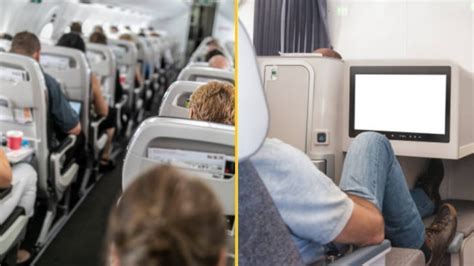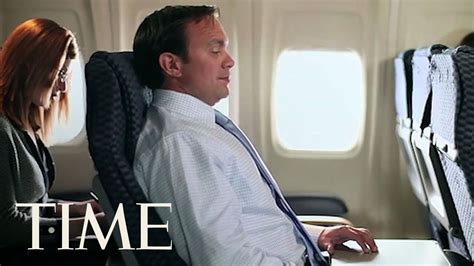
Reclining your airplane seat could soon cost you more than just dirty looks from your fellow passengers, as some airlines are considering implementing fines for excessive or inconsiderate reclining. The debate over airplane seat etiquette is intensifying, with potential financial penalties adding a new dimension to the ongoing discomfort.
The contentious issue of reclining airplane seats is reaching new altitudes as discussions around fining passengers for disruptive reclining gain traction. While not yet widespread practice, the prospect of financial repercussions for maximizing seat space is sparking debate among travelers, airlines, and etiquette experts. The core question remains: Where does one passenger’s comfort end and another’s begin, and can fines effectively regulate this delicate balance?
The debate has long simmered among passengers crammed into increasingly smaller spaces, especially in economy class. The ability to recline one’s seat is often seen as a basic right purchased with the ticket, while others view it as an imposition on the already limited personal space of the passenger behind. Airlines are now grappling with how to manage these conflicting needs, and fines represent one potential, albeit controversial, solution.
“Airlines are facing increasing pressure to find ways to improve the passenger experience,” explains travel industry analyst, John Miller. “The reclining seat debate is just one symptom of the larger issue of limited space and discomfort in air travel. Fines could be a way to deter inconsiderate behavior, but they also risk alienating passengers and creating new points of conflict.”
The potential implementation of fines raises numerous questions about enforcement, fairness, and the overall impact on passenger relations. This is especially true considering the already high stress levels often associated with air travel, from security lines to delayed flights.
Arguments for Fines
Proponents of fines argue that they are necessary to maintain a level of civility and respect among passengers. They contend that excessive or abrupt reclining can cause discomfort, inconvenience, and even injury to the person behind, especially if they are eating, working, or have limited mobility.
“I think there should be a fine, honestly. Especially when they slam back without warning. My laptop screen cracked because of this once,” says frequent flyer Sarah Jenkins.
The argument also extends to the impact on productivity. Passengers attempting to work on laptops or enjoy their meals can find it challenging when the seat in front is suddenly thrust back, significantly reducing their available space. In some cases, this can lead to spilled drinks, damaged equipment, and heightened frustration.
Beyond individual comfort, proponents suggest that fines could encourage passengers to be more mindful of their actions and consider the impact on others. The fear of financial penalty might prompt more considerate reclining practices, such as checking with the passenger behind before reclining or doing so slowly and gently.
Arguments Against Fines
Conversely, opponents of fines argue that they are an overreach of airline authority and an unfair imposition on passengers who have paid for the right to recline their seats. They argue that airlines should instead focus on providing more spacious seating options or addressing the underlying issue of cramped conditions in economy class.
“People pay for their seat; they should be allowed to use the features the seat has. If airlines are concerned about space, they should address the seat pitch,” says aviation lawyer, Michael Davis.
Furthermore, critics question the practicality and fairness of enforcing such fines. How would airlines determine what constitutes “excessive” or “inconsiderate” reclining? Who would be responsible for assessing the situation and issuing the fine – flight attendants, other passengers, or some automated system?
The potential for abuse and arbitrary enforcement is a major concern. What if a passenger has a medical condition that requires them to recline their seat for comfort or pain relief? What if the passenger behind is unusually tall or requires extra legroom? These scenarios highlight the complexity of the issue and the potential for fines to be applied unfairly.
Another argument against fines is that they could exacerbate tensions among passengers and create a more hostile travel environment. Instead of fostering cooperation and understanding, fines could lead to increased conflict and resentment.
Alternative Solutions
Given the controversy surrounding fines, many experts suggest exploring alternative solutions to the reclining seat debate. These include:
-
Redesigning Airplane Seats: Some companies are developing innovative seat designs that allow passengers to recline without significantly encroaching on the space of the person behind. These designs often involve sliding the seat forward instead of tilting it backward.
-
Adjustable Headrests and Legrests: Providing passengers with more control over their headrests and legrests can improve comfort without requiring them to recline their seats.
-
Staggered Seating Arrangements: Arranging seats in a staggered configuration can create more personal space for each passenger and reduce the impact of reclining.
-
Enhanced Communication: Encouraging passengers to communicate with each other about their needs and preferences can help to avoid misunderstandings and conflicts. Flight attendants can play a role in facilitating this communication and mediating disputes.
-
Designated Reclining Times: Airlines could designate specific times during the flight when reclining is permitted, such as after meal service or during periods of rest.
-
“Recline-Free” Zones: Creating sections of the aircraft where reclining is not allowed could provide passengers who prefer not to have seats reclining in front of them with a more comfortable option.
The Role of Airlines
Ultimately, the responsibility for resolving the reclining seat debate lies with the airlines. They must find a way to balance the needs of all passengers and create a more comfortable and respectful travel environment. This may involve a combination of strategies, including innovative seat designs, enhanced communication, and, potentially, fines as a last resort.
However, before implementing fines, airlines should carefully consider the potential consequences and ensure that they are applied fairly and consistently. They should also be transparent about their policies and procedures and provide passengers with clear guidelines on acceptable reclining behavior.
“Airlines need to listen to their passengers and be willing to experiment with different solutions,” says Miller. “There is no one-size-fits-all answer to the reclining seat debate, but by being proactive and responsive, airlines can create a more positive travel experience for everyone.”
The introduction of potential fines for reclining seats is a sign of the increasing pressures on airlines to manage passenger comfort in an era of shrinking personal space. Whether this approach will ultimately be successful remains to be seen, but it underscores the need for a broader discussion about the future of air travel and the importance of finding solutions that are fair, practical, and respectful of all passengers.
The Legal Perspective
From a legal standpoint, the implementation of fines for reclining seats raises some complex questions. Airlines have the right to set rules and regulations for passenger behavior, but these rules must be reasonable and non-discriminatory.
The legal basis for fines would likely rest on the airline’s contract of carriage, which outlines the terms and conditions of travel. However, courts may scrutinize these terms to ensure that they are not unduly burdensome or unfair to passengers.
“Airlines have broad authority to set rules, but those rules must be clear and consistently enforced. A vague policy on reclining could be challenged in court,” notes Davis.
Furthermore, the enforcement of fines could raise due process concerns. Passengers would need to have the opportunity to contest the fine and present their side of the story. Airlines would also need to establish clear procedures for investigating alleged violations and issuing penalties.
The legal implications of reclining seat fines are still uncertain, and it is likely that any such policy would be subject to legal challenges. Airlines should therefore proceed with caution and ensure that their policies are carefully drafted and legally sound.
The Psychological Impact
Beyond the practical and legal considerations, the reclining seat debate also has a significant psychological impact on passengers. The feeling of being cramped and confined in a small space can trigger feelings of anxiety, frustration, and even anger.
The act of reclining a seat can be seen as an assertion of control in an environment where passengers have limited autonomy. Conversely, being subjected to a reclining seat can feel like an invasion of personal space and a violation of one’s rights.
These psychological dynamics can contribute to heightened tensions and conflict among passengers. Fines could potentially exacerbate these tensions by creating a sense of mistrust and resentment.
Airlines should be mindful of the psychological impact of their policies and strive to create a travel environment that is as comfortable and stress-free as possible. This may involve providing passengers with more information and resources, such as relaxation techniques or mindfulness exercises.
The Future of Air Travel
The reclining seat debate is just one example of the challenges facing the airline industry as it grapples with increasing demand, limited resources, and evolving passenger expectations. The future of air travel will likely involve a combination of technological innovation, policy changes, and a greater focus on passenger well-being.
New technologies, such as virtual reality and augmented reality, could offer passengers new ways to entertain themselves and escape the confines of their seats. Airlines could also invest in more spacious seating configurations or offer premium seating options with more legroom and reclining space.
Policy changes, such as regulations on seat size and pitch, could help to ensure that passengers have a minimum level of comfort. Airlines could also implement more flexible booking policies, allowing passengers to choose their seats and customize their travel experience.
Ultimately, the future of air travel will depend on the ability of airlines to adapt to changing conditions and meet the evolving needs of their passengers. By embracing innovation, listening to their customers, and prioritizing passenger well-being, airlines can create a more sustainable and enjoyable travel experience for everyone.
The debate about reclining seats reflects broader issues in air travel today: diminished personal space, rising costs, and increasing passenger frustration. Whether fines become a common practice or remain a controversial concept, the discussion highlights the need for airlines to find creative solutions that balance the needs of all passengers. The industry’s response will not only shape the future of in-flight comfort but also influence the overall passenger experience for years to come. This issue also makes us ask ourselves, is your comfort worth the potential cost?
Frequently Asked Questions (FAQ)
Q1: Can I really be fined for reclining my airplane seat?
A: While not yet a widespread practice, some airlines are considering implementing fines for excessive or inconsiderate reclining. No major airline has officially implemented this as of yet. The idea is to deter behavior that significantly impacts the comfort and space of the passenger behind you. The exact criteria for what constitutes “excessive” or “inconsiderate” reclining would likely vary by airline, if they were to implement such a policy.
Q2: How would an airline determine if my reclining is “excessive” or “inconsiderate”?
A: This is one of the major challenges and points of contention. Airlines would likely need to establish clear guidelines and procedures for assessing reclining behavior. This could involve factors such as the angle of the recline, the speed at which the seat is reclined, and whether the passenger behind has been given any warning or consideration. Flight attendants would likely play a role in monitoring the situation and making a determination, potentially based on passenger complaints. The vagueness of such a policy opens the door to potential disputes.
Q3: What recourse do I have if I believe I’ve been unfairly fined for reclining my seat?
A: You would likely have the right to contest the fine through the airline’s customer service channels. Documenting the situation (e.g., taking photos, gathering witness statements) could be helpful in building your case. You could also file a complaint with the Department of Transportation (DOT) if you believe the airline has violated your rights as a passenger. It’s important to review the airline’s contract of carriage for specific details on dispute resolution procedures.
Q4: Are there any alternatives to fines that airlines are considering for managing the reclining seat issue?
A: Yes, several alternatives are being explored. These include redesigned airplane seats that recline forward instead of backward, adjustable headrests and legrests, staggered seating arrangements, designated reclining times, “recline-free” zones, and enhanced communication between passengers and flight attendants. Some airlines are also investing in premium seating options with more legroom and reclining space.
Q5: Does the airline’s contract of carriage address reclining seats?
A: The contract of carriage, which outlines the terms and conditions of travel, may contain clauses that address passenger behavior and conduct. However, it is less common to have an explicit written ruling on reclining the seat. It’s important to review your airline’s contract of carriage for specifics on what is and is not allowed during the flight. Airlines reserve the right to ensure the safety and comfort of all passengers.
Additional Information
The reclining seat debate is a microcosm of larger issues in the airline industry, including the trend towards denser seating configurations and the increasing pressure on airlines to maximize profits. Over the years, airlines have gradually reduced seat pitch (the distance between rows of seats) and seat width, resulting in less personal space for passengers.
This trend has been driven by the desire to increase the number of seats on each aircraft and to offer lower fares. However, it has also led to increased discomfort and frustration for passengers, particularly on long-haul flights.
The reclining seat issue is further complicated by the fact that passengers have different expectations and needs. Some passengers value the ability to recline their seats for comfort and relaxation, while others prioritize having enough space to work or eat.
Finding a solution that satisfies all passengers is a difficult challenge, but it is essential for creating a more positive and enjoyable travel experience. Airlines need to be willing to listen to their customers, experiment with different solutions, and prioritize passenger well-being.
In addition to the solutions mentioned above, airlines could also consider implementing more flexible boarding policies. Allowing passengers to board the aircraft in a more organized manner could reduce congestion and stress, making the overall travel experience more pleasant.
Airlines could also invest in better in-flight entertainment systems. Providing passengers with a wider range of movies, TV shows, and games could help to distract them from the discomfort of their seats and make the flight feel shorter.
Ultimately, the future of air travel will depend on the ability of airlines to adapt to changing conditions and meet the evolving needs of their passengers. By embracing innovation, listening to their customers, and prioritizing passenger well-being, airlines can create a more sustainable and enjoyable travel experience for everyone. The implementation of fines, while a potential tool, must be approached with caution and a clear understanding of its potential consequences.
The current discourse highlights the complex dynamics within the airline industry, demanding a holistic approach that encompasses passenger comfort, operational efficiency, and fair policies. The debate over reclining seats is not just about inches of space; it reflects a broader struggle for a more humane and enjoyable flying experience in an era defined by increasingly crowded skies.









